Key takeaways:
- Ethical evidence sharing enhances collaboration among medical professionals, leading to improved patient care and outcomes.
- Medical decision support tools streamline information for clinicians, boost diagnostic confidence, and increase patient engagement in their care.
- Key principles of ethical sharing include respect for autonomy, confidentiality, and responsible data use to foster trust and accountability.
- Building partnerships with diverse stakeholders enriches ethical practices and improves the understanding of community needs in healthcare.
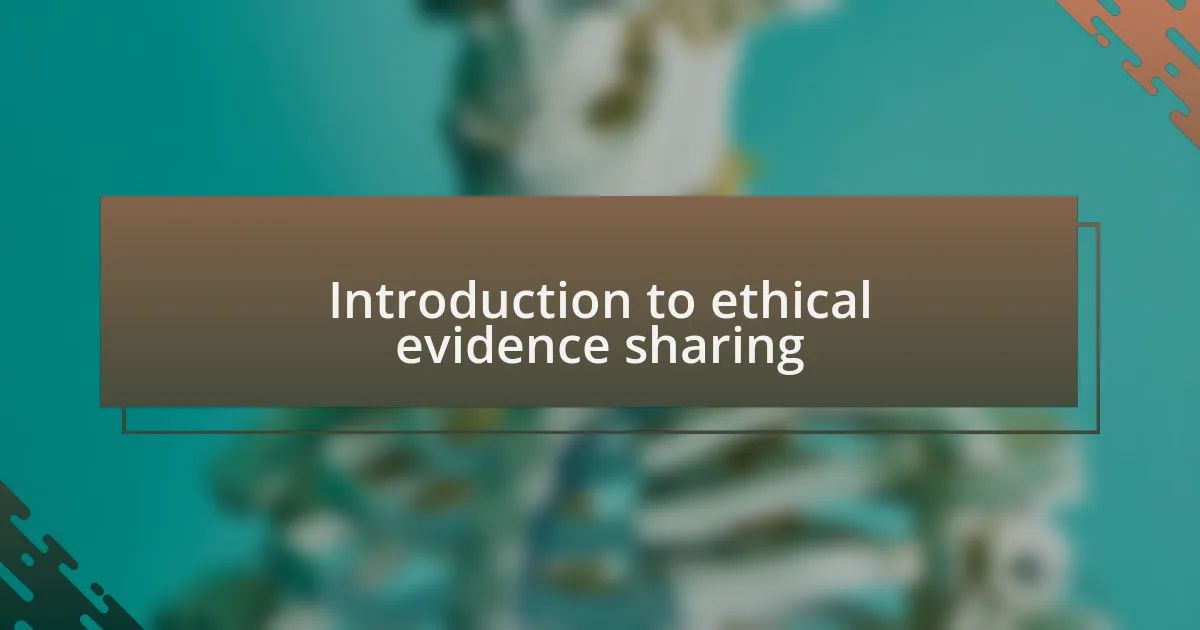
Introduction to ethical evidence sharing
Ethical evidence sharing is a cornerstone of responsible medical decision-making. In my experience, I’ve often seen firsthand how access to shared knowledge can illuminate the path to better patient care. When researchers and clinicians collaborate openly, they not only enhance their individual practices but also contribute to a collective understanding that ultimately benefits everyone involved.
Imagine a scenario where a hospital implements a new treatment protocol based on shared research findings. The ripple effect of this information can transform patient outcomes, saving lives and improving healthcare quality. How often do we consider the power of community in advancing medicine? I’ve learned that when we prioritize ethical sharing, we build a trust framework that encourages innovation and accountability.
Furthermore, ethical evidence sharing goes beyond mere compliance; it fosters a culture of transparency and respect among professionals. I’ve seen colleagues thrive when they feel confident in their ability to share insights without fear of misappropriation. This open dialogue creates a vibrant ecosystem where information flows freely, and everyone is empowered to make informed decisions that prioritize the well-being of patients.
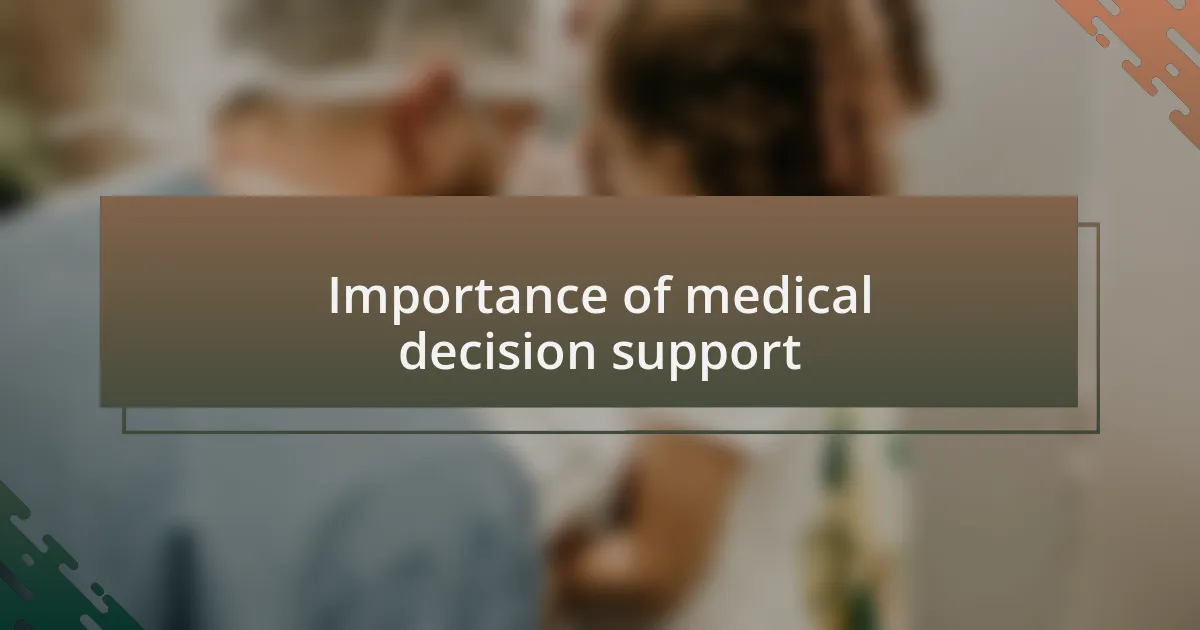
Importance of medical decision support
Medical decision support plays a critical role in aligning patient care with the latest evidence-based practices. I recall a situation in a previous clinic where we implemented a decision support system to assist in diagnosing complex cases. The resulting collaboration among healthcare providers not only improved diagnostic accuracy but also boosted the confidence of clinicians in delivering care. It’s amazing how the integration of smart tools can enhance decision-making when faced with uncertainty.
One of the most profound aspects of medical decision support is its ability to streamline information, ensuring that clinicians have relevant data at their fingertips. I remember a time when I was overwhelmed by the sheer volume of medical literature; it felt like drowning in an ocean of information. However, with the right decision support tools, I discovered how manageable and useful that information could become, leading to more confident clinical judgments and better patient outcomes. How often do we overlook the immense benefits that come from synthesizing vast amounts of knowledge into actionable insights?
Another facet of medical decision support is its impact on patient engagement. When patients are partners in their care, armed with clear and accessible information, their involvement in decision-making skyrockets. I’ve personally felt the shift in dynamics during consultations, as patients express eagerness to understand their options fully. Isn’t it incredible how informed patients can lead to more personalized treatment plans? This engagement not only enhances satisfaction but also fosters a sense of empowerment that can transform the healthcare experience.
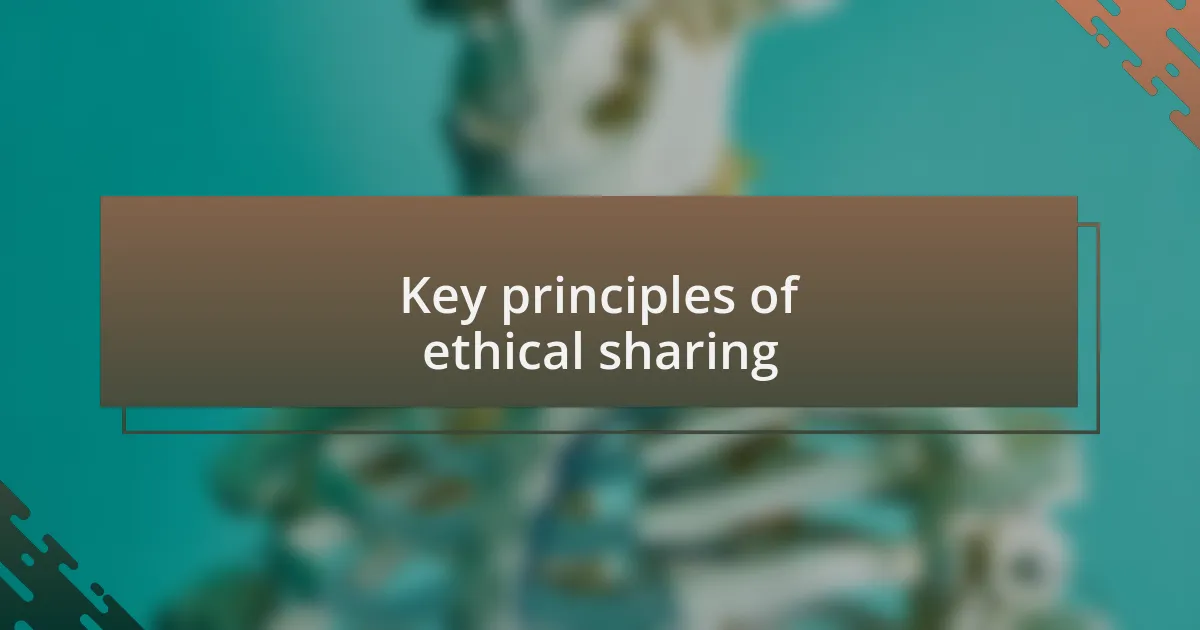
Key principles of ethical sharing
Key principles of ethical sharing revolve around respect for autonomy, confidentiality, and the ethical use of data. I’ve seen firsthand how critical it is to ensure that individuals who provide information are fully aware of how it will be used. There was an instance in our clinic where we needed consent from patients for research purposes. Taking the time to explain the implications of their participation fostered trust and encouraged more open communication. Isn’t it vital that patients feel their choices are honored?
Confidentiality also plays a crucial role in ethical sharing. I distinctly remember a case where sensitive patient information was at risk of being shared without proper safeguards. It was a wake-up call for our team; we had to reinforce the importance of data protection protocols. Knowing that patients trust us to handle their information responsibly can forge stronger doctor-patient relationships. Have you ever considered how confidentiality impacts the willingness of patients to share their stories?
Finally, the responsible use of data cannot be overlooked. In my experience, utilizing data ethically means not only protecting it but also ensuring it serves the greater good. For example, during a recent project, we analyzed de-identified data to improve treatment protocols without compromising individual identities. This approach highlighted for me how ethical sharing can lead to significant advancements while still respecting patient rights. Isn’t it fascinating how we can harness knowledge for improved care while remaining principled in our methods?
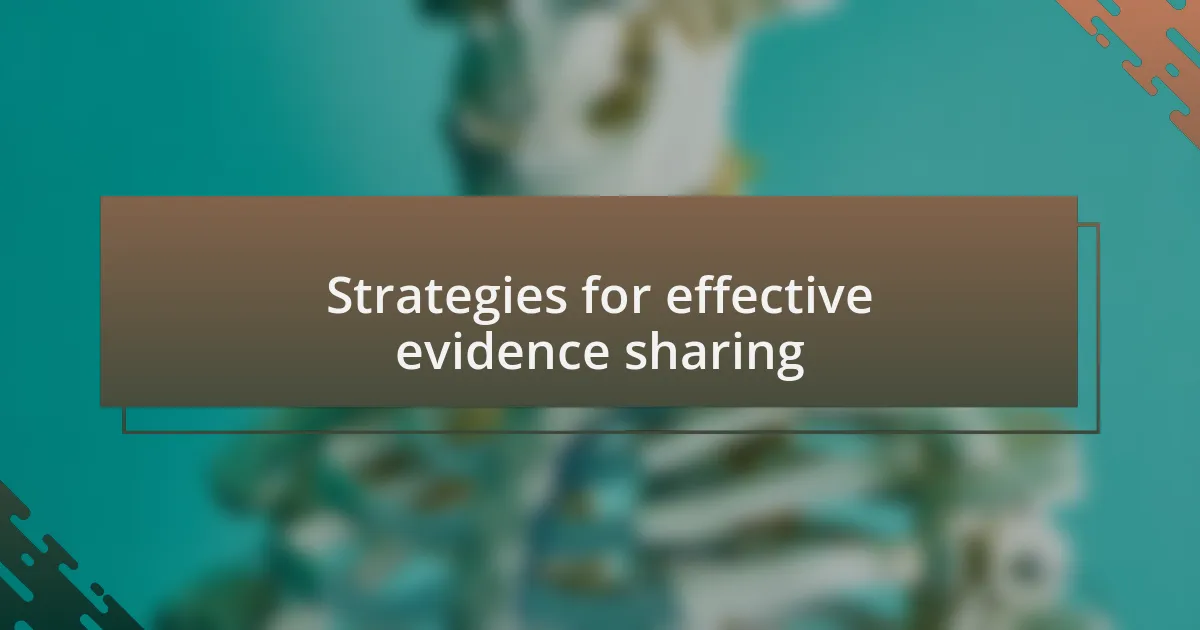
Strategies for effective evidence sharing
One effective strategy for evidence sharing is creating collaborative networks among healthcare professionals. In my experience, these networks foster an environment where knowledge can be freely exchanged. I remember attending a local conference where diverse practitioners shared case studies and best practices, which ultimately led to improved patient outcomes. Have you ever witnessed the power of collaborative learning in elevating care standards?
Another crucial tactic is utilizing technology to facilitate evidence access and transparency. I once implemented a shared online platform for our team to upload and review clinical guidelines. This not only streamlined our decision-making process but also encouraged dialogue about the evidence behind our choices. How often do we underestimate the role of simple tools in transforming our approach to information sharing?
Lastly, promoting ongoing education on ethical evidence sharing for all team members is vital. I’ve seen that when colleagues understand the ethical implications and potential impacts of evidence sharing, they become more invested in the process. During a workshop I conducted, I noticed a marked increase in enthusiasm and questions about how to engage responsibly. Isn’t it remarkable how knowledge empowers our responsibility towards ethical practices?
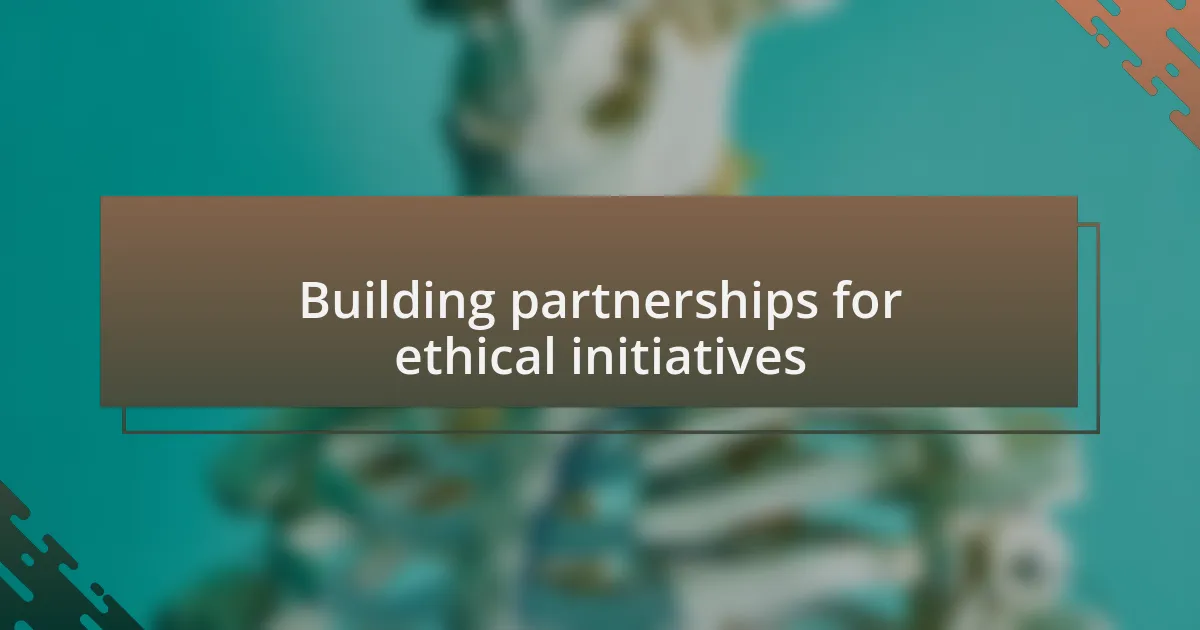
Building partnerships for ethical initiatives
When I think about building partnerships for ethical initiatives, I remember a collaboration I formed with a local nonprofit focused on healthcare access. Joining forces allowed us to not only pool resources but also amplify our voices on ethical standards. I often reflect on how this partnership enriched our understanding of community needs, leading to more targeted and ethical evidence-sharing practices.
Creating alliances with diverse stakeholders can significantly enhance the ethical landscape of evidence sharing. For example, partnering with patient advocacy groups provided us deeper insights into the concerns of those we serve. It became evident to me that their perspectives weren’t just valuable—they were essential in shaping ethical guidelines that truly resonated with the community. Have you ever thought about how much richer an initiative could be when it includes those it aims to help?
Moreover, nurturing long-term relationships with academic institutions has proven beneficial in developing rigorous ethical standards. I’ve participated in joint research projects where ethical evidence-sharing practices were meticulously studied and refined. Witnessing firsthand how these collaborative efforts foster accountability and trust among practitioners was eye-opening. Isn’t it fascinating how shared goals can unite varying perspectives for a greater good?
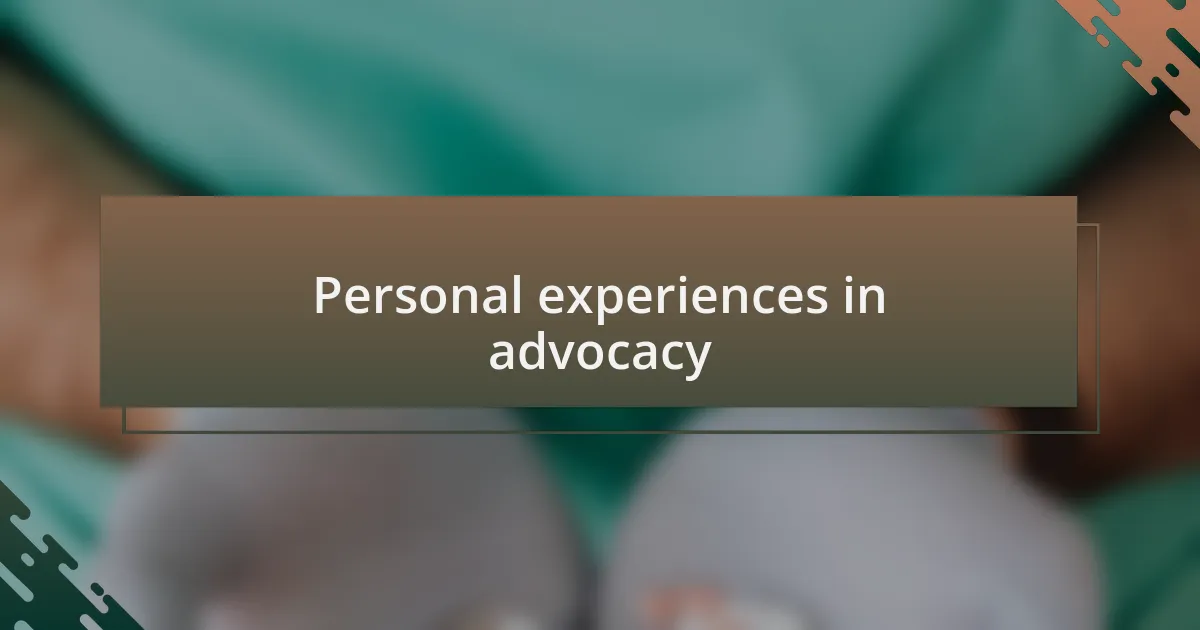
Personal experiences in advocacy
In my journey as an advocate, I’ve often found myself in challenging situations that tested my commitment to ethical evidence sharing. One particular instance stands out: I was part of a panel discussion where I had to confront uncomfortable truths about data misuse in healthcare. Standing before a diverse audience, I felt a mix of vulnerability and determination. It was then that I realized how essential it is to share not just the facts, but also the stories behind them. Have you ever felt that kind of weight when discussing complex issues?
Another powerful moment came during a workshop I facilitated for community leaders. I encouraged them to share their own experiences with data sharing and its ethical implications. Listening to their stories, I was struck by how vulnerable they felt discussing patient data. This opened my eyes to the importance of creating safe spaces for dialogue, where everyone can voice their concerns. It became clear to me that advocacy isn’t just about what we know—it’s about how we connect and empathize with each other’s struggles.
I also remember a time when I organized a community forum aimed at bridging gaps between researchers and patients. The room was filled with passionate individuals eager to share their insights and frustrations. Witnessing this collective energy, I felt a surge of hope. It struck me then that advocacy is not just an individual effort, but a communal journey—and we’re all in it together. How often do we take a moment to celebrate those connections that empower us to advocate for ethical practices?